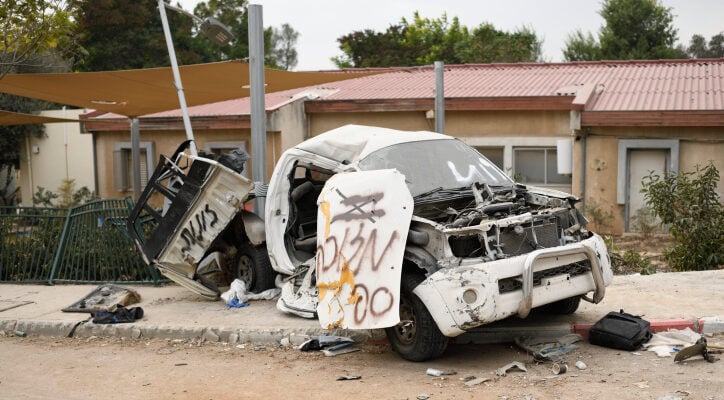Ofakim’s residents face high unemployment, psychological trauma, and the grief of losing loved ones and friends on that dark day.
By Eitan Elhadez-Barak, TPS
The evacuees are slowly returning to Ofakim. Shops are reopening and quiet has returned to the streets. But a short visit makes it clear that the town which lost 52 of its residents will never be the same again.
The unemployed people who worked in the now-ruined factories of southern Israel are strapped for cash. People who have seen the harsh sights of war have lost the sparkle in their eyes. The home of Rachel Edri, a grandmother who saved herself from Hamas terrorists with charm and chocolate chip cookies is a pilgrimage site. But Rachel and her husband David evacuated and are now staying with relatives elsewhere.
In every square, you find signs that say “Israel lives and you are a city of heroes,” but even a huge graffiti inscription that reiterates that message on the side of a tall apartment building cannot hide the truth.
The blue-collar development town of around 40,000 that for several hours on Oct. 7 became hostage to Hamas terrorists is still licking its wounds.
The evacuees who return from the hugs, the performances, and the support they receive in the hotels, have experienced a dramatic fall into the abyss. Ofakim’s residents face high unemployment, psychological trauma, and the grief of losing loved ones and friends on that dark day.
“Only two weeks ago I started to return to activity,” says the owner of an ice cream shop located at the entrance to the city. “I lost 24 customers who I know what flavor of ice cream they like,” he tells me.
It seems that Ofakim’s only joy comes when freed hostages pass through their community on the way to the Hatzor Air Force base. Every night since the temporary ceasefire began, residents and journalists arrive at “Hostage Square,” a collection of posters, flowers, candles, and graffiti to wave and cheer as the convoy comes and goes.
The traditional city is becoming increasingly Orthodox. One young Orthodox man smiles and tells me that he is waiting for the abductees to return. Inside a convenience store, a young man wearing a kippah asks, “Tell me, is there anything interesting to do here?” He answers, half-jokingly, “It’s a dead city, there’s nothing to do here.”
Small memorials have sprouted in Shapira, Ofakim’s southern neighborhood where a bitter battle was fought to defend the town. The city was somehow defended by outgunned police officers and residents armed with small handguns and knives.
“Here I was chased by a terrorist, and bullets whistled past me until I locked myself in the shelter,” one man tells me.
A young bearded man in a sports suit and a hooded shirt that covers his head guides me to Rachel Edri’s home as he explains the power of its symbolism to the rest of Ofakim.
Five terrorists, he says, barricaded themselves inside David and Rachel Edri’s home for several hours. Thinking quickly, she offered them refreshments, and later a meal, engaging them in small talk, playing for time until security personnel came to the rescue.
“I don’t know how I am alive,” Edri, 65, would later tell reporters.
The Edris, my guide insists, are simply “ordinary people,” just like the rest of Ofakim.
My guide elaborates on the battles he saw, the people who died in front of his eyes, his turn to religion in the past few months, and the loss of his job. In the aftermath of the Oct. 7 attacks, the factory he worked in was closed.
“I don’t even have money to bring to my children and family,” he says sadly as he asks for a small donation.
Another man, Yehiel, comes from his house near the scene of the battle.
“For years I have been wishing for the day when I would avenge the death of my brother in the Yom Kippur War,” he tells me. The war was 50 years ago, a long time to sit with a desire for revenge.
“When the terrorists arrived, they didn’t notice me. I ran to their van, which was all loaded with weapons. I picked up a Kalashnikov and said to myself, ‘I’ll avenge my brother’s death. I thought that if I kill three terrorists, I could go to his grave, hear his cry of joy, and that would close the circle,” he recalled.
But Yehiel couldn’t bring himself to use the rifle. He was afraid of being mistaken for a terrorist.
“I stopped an army vehicle and told [the soldier], ‘I am entrusting you with the weapons of the terrorists. Make sure you do the right thing with it.”
Toward nightfall, residents and journalists arrived at “Hostage Square,” with their flags and cameras to welcome home tonight’s freed captives.
But tonight, there is disappointment. The government flew the hostages directly from the Kerem Shalom crossing to the Tel Aviv-area hospitals.
“Then take at least hot tea,” suggests a young resident carrying a large thermos, cookies, and Israel’s popular Krembo cookie and marshmallow treats.
“We are lucky people of Ofakim,” he says. “We have each other.”





